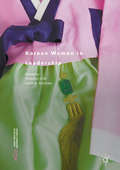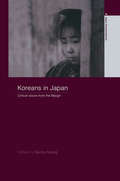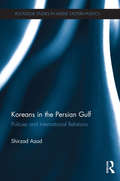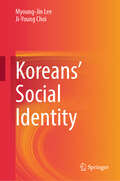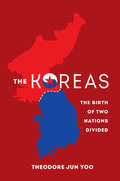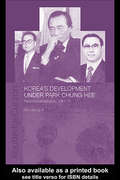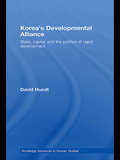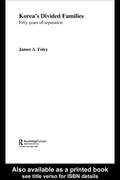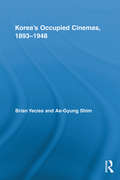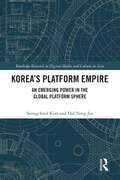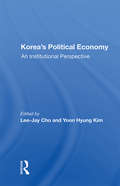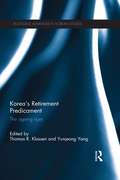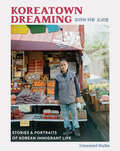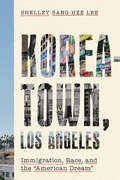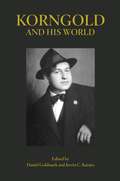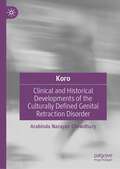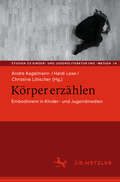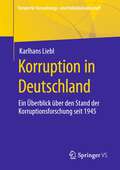- Table View
- List View
Korean Women in Leadership (Current Perspectives on Asian Women in Leadership)
by Gary N. McLean Yonjoo ChoThe book focuses on the historical, political, economic, and cultural elements of Korea and the strong influence these have on women leaders in the nation. It examines challenges and opportunities for women leaders as they try to balance their professional and personal lives. A team of leading experts familiar with the aspirations and frustrations of Korean women offer insight into the coexistence of traditional and modern values. It is an eye-opening look at the convergence and divergence across Korean sectors that international leadership researchers, students, and managers need to know in order to realize and appreciate the potential of Korean women leaders.
Korean Women Managers and Corporate Culture: Challenging Tradition, Choosing Empowerment, Creating Change (Routledge Studies in the Growth Economies of Asia)
by Jean R. RenshawThe typical view of Korean women is not as managers. The stereotype is of Korean women serving and pleasing men, or more recently as aggressive shopkeepers and bar-owners. Very little has been written to challenge this misconception. This fascinating book reveals there have always been managers amongst Korean women, particularly in occupations like money lending, retail and fashion, and women continue to serve after the economic crash at the beginning of a new century. Korean Women Managers and Corporate Culture illuminates the many roles of women - from management, leadership and policy making, to the more traditional positions as homemaker and wife – and describes the distinctive Korean corporate culture and economy in order to evaluate the future of women as well as that of Korea itself.
The Korean Women's Movement and the State: Bargaining for Change (ASAA Women in Asia Series)
by Seung-kyung Kim Kyounghee KimThis book asks what strategies women’s movements can employ to induce law and policy changes at the national level that will assist women’s equality without sacrificing their feminist energy, movement cohesiveness and core feminist commitments. The book takes up this question in order to emphasize the need not only to recognize the accomplishments of women’s movements through political participation, but also to analyze the process through which feminist organizations interact with formal politics. It examines the institutionalization of the Korean women’s movement under the progressive presidencies of Kim Dae Jung (1998-2002) and Roh Moo Hyun (2003-2007), focusing on three major pieces of legislation concerning women’s rights that were enacted during this time, and looks at the process of gender politics and the strategic bargains that needed to be made between the women’s movement and other political forces in order to advance their agenda. It questions whether the institutionalization of the women’s movement inevitably results in demobilization and deradicalization, and goes on to examine the relationship between the women’s movement and the government over the two most women-friendly administrations in South Korean history, a period marked by flourishing civil society activism and participatory democracy.
Korean Workers and Neoliberal Globalization (Routledge Advances in Korean Studies #Vol. 11)
by Kevin GrayOne of the most remarkable aspects of South Korea’s transition from impoverished post-colonial nation to fully-fledged industrialized democracy has been the growth of its independent and dynamic labour movement. Korean Workers and Neoliberal Globalisation examines current trends and transformations within the Korean labour movement since the 1990s. It has been a common assumption that the ‘third wave’ of democratisation, the end of the Cold War, and the spread of neoliberal globalisation in the latter part of the 20th century have helped to create an environment in which organised labour is better placed to overcome bureaucratic national unionism and transform itself into a potential counter-globalisation movement. However, Kevin Gray argues that despite the apparent continued phenomena of labour militancy and the rhetoric of anti-neoliberalism, the mainstream independent labour movement in Korea has become increasingly institutionalised and bureaucratised into the new capitalist democracy. This process is demonstrated by the Korean Confederation of Trade Unions’ experience of participation in various forms of policy making forums. Gray suggests that as a result, the KCTU has failed to mount an effective challenge against processes of neoliberal restructuring and concomitant social polarisation. The Korean experience provides an excellent case study for understanding the relationship between organised labour and globalisation. Korean Workers and Neoliberal Globalisation will appeal to students and scholars of Korean studies and International Political Economy, as well as Asian politics and economics.
Koreans in Japan: Critical Voices from the Margin (Routledge Studies in Asia's Transformations)
by Sonia RyangKoreans in Japan are a barely known minority, not only in the West but also within Japan itself. This pioneering study analyzes these relations in the context of the particular conditions and constraints that Koreans face in Japanese society. The contributors cover a wide range of topics, including: * the legal and social status of Koreans in Japan * the history of Korean colonial displacement and postcolonial division during the Cold War * ethnic education * women's self-expression. These studies serve to reveal the highly resilient and diverse reality of this minority group, whilst simultaneously highlighting the fact that - despite recent improvement - legal, social and economic constraints continue to exist in their lives.
Koreans in the Persian Gulf: Policies and International Relations (Routledge Studies in Middle Eastern Politics)
by Shirzad AzadAnalyzing the Korean Peninsula's contemporary engagement with the Persian Gulf region from the 1950s to the present day, the book begins by asking the following question: What drew Koreans to the region in the first place and under what circumstances were they drawn there? While taking into account a combination of both external and internal factors shaping the dynamics of the Korean Peninsula's interactions with the Persian Gulf region, this book largely concentrates on the agency factor to analyze the nature and scope of a rather multifaceted relationship between the two areas. The Republic of Korea has, in fact, maintained diverse connections to every single country in the Persian Gulf over the past several decades, and its rather considerable activities and accomplishments in the region all justify such an overwhelming focus. The Democratic People's Republic of Korea's record in the Persian Gulf, however, is mostly limited to its relationship with Iran, though Pyongyang has pursued relationships with some other states in the region. This book studies the elements of Pyongyang's actions in the region as an appendage to South Korea's various political and economic achievements. Employing a process-tracing approach, this book will be of interest to policymakers, as well as to students and scholars of International Relations, Middle East Studies and Asian Studies.
Koreans' Social Identity
by Myoung-Jin Lee Ji-Young ChoiThis book examines the changing characteristics of Korean society and Koreans in various areas, including politics, economics, and society, providing rich analyses on social identity. Factoring in the trajectory of Korean history, the authors chart the rapid economic growth of Korea and the ways in which this has significantly improved Koreans' material living standards. The book shows that despite the Cold War and inter-Korean confrontation, active citizen participation has institutionalized democracy in Korea. A society once characterized by strong familial ties and patriarchal verticality has shifted to a more horizontal structure with diverse values. Transitions from agricultural to industrial and information societies have occurred within one or two generations. Rapid aging is another critical issue, with Korea experiencing one of the fastest aging trends globally. The shift toward a multicultural society challenges the traditional identity of Koreans based on a single ethnicity. Against this backdrop, this book seeks to capture the characteristics of changing Korean society and the people living in it, based on the concept of social identity that an individual's evaluation is not just a temporary personal feeling or prejudice but a cultural product. It allows for an objective analysis of a society or its cultural characteristics by measuring social identity. The first part of the book introduces the concept of social identity and presents analysis results in several fields. The second examines changes in the values and attitudes of representative Koreans. The third part discusses the social problems and tasks created by the changes in various values and attitudes. Finally, the last section explores concrete measures to overcome these problems and aim for social integration in future and emphasizes elements that enhance social trust and integration. It is relevant to sociologists and scholars working across various social science dimensions focused on Korea.
The Koreas: The Birth of Two Nations Divided
by Theodore Jun YooWhat history, pop culture, and diaspora can teach us about North and South Korea today.Korea is one of the last divided countries in the world. Twins born of the Cold War, one is vilified as an isolated, impoverished, time-warped state with an abysmal human rights record and a reclusive leader who perennially threatens global security with his clandestine nuclear weapons program. The other is lauded as a thriving democratic and capitalist state with the thirteenth largest economy in the world and a model for developing countries to emulate. In The Koreas, Theodore Jun Yoo provides a compelling gateway to understanding the divergent developments of contemporary North and South Korea. In contrast to standard histories, Yoo examines the unique qualities of the Korean diaspora experience, challenging the master narratives of national culture, homogeneity, belongingness, and identity. This book draws from the latest research to present a decidedly demythologized history, with chapters focusing on feature stories that capture the key issues of the day as they affect popular culture and everyday life. The Koreas will be indispensable to any historian, armchair or otherwise, in need of a discerning and reliable guide to the region.
Korea's Development Under Park Chung Hee: Rapid Industrialization, 1961-79 (Routledge/Asian Studies Association of Australia (ASAA) East Asian Series)
by Hyung-A KimBased on personal interviews with the principal policy-makers of the 1970s, Korea's Development under Park Chung-Hee examines how the president sought to develop South Korea into an independent, autonomous sovereign state both economically and militarily. Kim provides a new narrative in the complex task of exploring the paradoxical nature and effects of Korea's rapid development which maintains that any judgement of Park must consider his achievements in the socio-economic, cultural and political context in which they took place. Aspects of Park's government analyzed include:*his abhorrence of Korea's reliance on the US presence*the Korean model of state-guided industrialization*Park's rapid development strategy *the role of the ruling elites*Park's clandestine nuclear development program*the heavy chemical industrialisation of the 1970sThe prevailing popularity of Park in the eyes of the Korean public is significant and relevant to their acceptance of how their national development was achieved. This book tells that story while simultaneously recognizing the flaws in the process. With a great deal of material never before published, scholars of Korean politics and history at all levels will find this book a stimulating account of South Korea in the 1960s and 1970s.
Korea's Developmental Alliance: State, Capital and the Politics of Rapid Development (Routledge Advances in Korean Studies)
by David HundtSouth Korea is often cited as a case of miraculous transformation from poverty to prosperity. Korea’s achievement of moving from one of the world’s poorest countries as recently as the early 1960s to the ranks of the ten biggest economies only four decades later has rightly attracted interest from policymakers and scholars alike. This book identifies the factors that shaped relations between the state and big business in Korea, the ‘developmental alliance’. These factors offer a cogent framework in which to identify and predict changes in power relations between government and business. Rather than merely offering a means of explaining the rapid-growth phase of Korean development, the politics of the developmental alliance also help us understand how and why the Korean miracle turned to crisis in 1997 and why the subsequent recovery has been so uneven. In this way, the book highlights the political power of business, which is often underplayed in discussions of the development of Korea. It also sheds light on the constraints on policymakers during modernisation, and how power is shared among a small number of powerful parties. Illustrating the tumultuous politics of the ‘developmental alliance’ between business and government during the rise and decline of South Korea’s economic miracle, this book is an essential read for anyone interested in Korean politcs, economics and development,
Korea's Divided Families: Fifty Years of Separation
by James FoleyThe divided families problem is a serious social issue in North and South Korea, involving hundreds of thousands of first generation divided family members, most of whom have not seen their relatives since the Korean War. It is the most pressing humanitarian issue between the two Koreas, and is connected to the greater issue of human rights in North Korea today. However, little serious academic work exists on the subject, in either English or Korean. This new study, based on research conducted in Korea, including interviews in 2001 with Korean families who benefited from the most recent exchanges, addresses the many issues surrounding the divided family problem, and highlights its importance in the path towards Korean rapprochement.
Korea's Occupied Cinemas, 1893-1948: The Untold History of the Film Industry (Routledge Advances in Film Studies)
by Brian Yecies Ae-Gyung ShimKorea’s Occupied Cinemas, 1893-1948 compares and contrasts the development of cinema in Korea during the Japanese occupation (1910-1945) and US Army Military (1945-1948) periods within the larger context of cinemas in occupied territories. It differs from previous studies by drawing links between the arrival in Korea of modern technology and ideas, and the cultural, political and social environment, as it follows the development of exhibition, film policy, and filmmaking from 1893 to 1948. During this time, Korean filmmakers seized every opportunity to learn production techniques and practice their skills, contributing to the growth of a national cinema despite the conditions produced by their occupation by colonial and military powers. At the same time, Korea served as an important territory for the global expansion of the American and Japanese film industries, and, after the late 1930s, Koreans functioned as key figures in the co-production of propaganda films that were designed to glorify loyalty to the Japanese Empire. For these reasons, and as a result of the tensions created by divided loyalties, the history of cinema in Korea is a far more dynamic story than simply that of a national cinema struggling to develop its own narrative content and aesthetics under colonial conditions.
Korea’s Platform Empire: An Emerging Power in the Global Platform Sphere (Routledge Research in Digital Media and Culture in Asia)
by Dal Yong Jin Seongcheol KimKorea’s Platform Empire explores the evolution of digital platforms in South Korea’s media sphere, and their global political, economic, cultural, and technological influence.With a focus on Korea in the context of the global platform revolution, the book takes a methodical look at the broader social implications and the impact on cultural production. The authors explore various facets of the media and cultural industries—looking beyond social media to news broadcasting and the music industry—and look at the policy and regulations behind this shifting technological advancement.This book will appeal to students and scholars working on media industries, digital media, platform studies, information and technology studies, Korean and East Asian media studies, and the creative and cultural industries.
Korea's Political Economy: An Institutional Perspective
by Lee-Jay Cho Yoon Hyung KimOver the past three decades, South Korea has moved along a path of strong economic growth and political democratization, attracting worldwide attention and providing valuable lessons for other developing economies. Yet Korea still must grapple with many intractable problems fueled by its rapid industrialization and uneven growth, including unbalanced distribution of wealth, concentrated economic power, and adversarial relationships between management and labor. Within the context of these sweeping changes, this volume explores options for economic and social institutional reform in Korea. Drawing on models of economic development from Japan, the United States, and Europe, a distinguished group of Asian and Western scholars relates the experiences of previously industrialized economies to each facet of Koreas economic system, including national management; taxation and banking; land ownership and use; trade and industrial strategy; and relations among business ownership, management, and labor. In so doing, the contributors provide valuable insights and fresh proposals for a viable model of social and economic modernization. Throughout the volume, the contributors emphasize the importance of Koreas cultural heritage-not only in explaining the nations recent growth but also as a key element of its continued success. By providing an overview of the evolution and interaction of Korean economic, political, and sociocultural institutions, the contributors make clear how these structures mediate the movement between cultural values and economic progress.
Korea's Retirement Predicament: The Ageing Tiger (Routledge Advances in Korean Studies)
by Thomas R. Klassen Yunjeong YangThe distinguishing feature for many workers in South Korea is contractual – and often involuntary – retirement at a young age (mid-50s for most workers) followed by precarious and low-paying self-employment or contract work. In the past this practice, which is also found in other East Asian nations, provided firms with a youthful and highly productive workforce. However, with a rapidly aging population and shifts in the labour market, the existing arrangement is becoming less and less functional. This book examines how this retirement arrangement arose, and the policy reforms that have been both undertaken and proposed to allow workers to remain employed longer. The analysis focuses on the institutional constraints to reforms, as well as the impact forced retirement has on individuals. Using a multi-disciplinary and comparative approach, the authors study contractual mandatory retirement trends and policies in South Korea, and in doing so illuminate the political, social, legal, economic and labour market implications of this widespread practice. As nations across Asia face aging populations, this book will be welcomed by students and scholars interested in Korean studies, social policy, social welfare and gerontology. It will also be of great value to policy makers.
Koreatown Dreaming: Stories & Portraits of Korean Immigrant Life
by Emanuel HahnExplore and celebrate Korean culture in America through photographs and interviews by award-winning photographer Emanuel Hahn. "Photographer Hahn's animated and vivid debut . . . is exceptional." —Publisher's Weekly, Starred Review Since the first wave of Korean immigration in the early 1900s, Korean immigrants have opened and operated small businesses across the country that enrich the cultural fabric of our communities. Yet their stories are too often overlooked, as even today their existence is being pushed to the margins of American society. In Koreatown Dreaming, a project that began in Los Angeles and expanded to eight other cities, the lives of Korean immigrants are observed with care and admiration under Hahn's tender, capacious gaze. Hahn's arresting photographs and narrativized interviews portray Korean small business owners as key figures not just in their neighborhoods but in their own lives, where they experience personal struggle, sacrifice, triumph, growth, and joy.Koreatown Dreaming is at once an anecdotal history of Korean immigration and a touching homage to Korean immigrant life. These intimate stories of over 50 small businesses are a testament to the American Dream, even while complicating the illusions of that promise, and of what it means to be American. Cities featured: Los Angeles, California; Atlanta, Georgia; Annandale, Virginia; New York, New York; Flushing, New York; Pal Park, New Jersey; Fort Lee, New Jersey; Dallas, Texas; Honolulu, Hawaii.
Koreatown, Los Angeles: Immigration, Race, and the "American Dream" (Asian America)
by Shelley Sang-Hee LeeThe story of how one ethnic neighborhood came to signify a shared Korean American identity. At the turn of the twenty-first century, Los Angeles County's Korean population stood at about 186,000—the largest concentration of Koreans outside of Asia. Most of this growth took place following the passage of the Hart-Celler Act of 1965, which dramatically altered US immigration policy and ushered in a new era of mass immigration, particularly from Asia and Latin America. By the 1970s, Korean immigrants were seeking to turn the area around Olympic Boulevard near downtown Los Angeles into a full-fledged "Koreatown," and over the following decades, they continued to build a community in LA. As Korean immigrants seized the opportunity to purchase inexpensive commercial and residential property and transformed the area to serve their community's needs, other minority communities in nearby South LA—notably Black and Latino working-class communities—faced increasing segregation, urban poverty, and displacement. Beginning with the early development of LA's Koreatown and culminating with the 1992 Los Angeles riots and their aftermath, Shelley Sang-Hee Lee demonstrates how Korean Americans' lives were shaped by patterns of racial segregation and urban poverty, and legacies of anti-Asian racism and orientalism. Koreatown, Los Angeles tells the story of an American ethnic community often equated with socioeconomic achievement and assimilation, but whose experiences as racial minorities and immigrant outsiders illuminate key economic and cultural developments in the United States since 1965. Lee argues that building Koreatown was an urgent objective for Korean immigrants and US-born Koreans eager to carve out a spatial niche within Los Angeles to serve as an economic and social anchor for their growing community. More than a dot on a map, Koreatown holds profound emotional significance for Korean immigrants across the nation as a symbol of their shared bonds and place in American society.
Korngold and His World (The\bard Music Festival Ser. #45)
by Daniel Goldmark Kevin C. KarnesA brand-new look at the life and music of renowned composer Erich Wolfgang KorngoldErich Wolfgang Korngold (1897–1957) was the last compositional prodigy to emerge from the Austro-German tradition of Mozart and Mendelssohn. He was lauded in his youth by everyone from Mahler to Puccini and his auspicious career in the early 1900s spanned chamber music, opera, and musical theater. Today, he is best known for his Hollywood film scores, composed between 1935 and 1947. From his prewar operas in Vienna to his pathbreaking contributions to American film, Korngold and His World provides a substantial reassessment of Korngold’s life and accomplishments.Korngold struggled to reconcile the musical language of his Viennese upbringing with American popular song and cinema, and was forced to adapt to a new life after wartime emigration to Hollywood. This collection examines Korngold’s operas and film scores, the critical reception of his music, and his place in the milieus of both the Old and New Worlds. The volume also features numerous historical documents—many previously unpublished and in first-ever English translations—including essays by the composer as well as memoirs by his wife, Luzi Korngold, and his father, the renowned music critic Julius Korngold.The contributors are Leon Botstein, David Brodbeck, Bryan Gilliam, Daniel Goldmark, Lily Hirsch, Kevin Karnes, Sherry Lee, Neil Lerner, Sadie Menicanin, Ben Winters, Amy Wlodarski, and Charles Youmans.Bard Music Festival 2019Korngold and His WorldBard CollegeAugust 9–11 and 16–18, 2019
Koro: Clinical and Historical Developments of the Culturally Defined Genital Retraction Disorder
by Arabinda Narayan ChowdhuryThis book provides a definitive account of koro, a topic of long-standing interest in the field of cultural psychiatry in which the patient displays a fear of the genitals shrinking and retracting. Written by Professor A.N. Chowdhury, a leading expert in the field, it provides a comprehensive overview of the cultural, historical and clinical significance of the condition that includes both cutting-edge critique and an analysis of research and accounts from the previous 120 years published literature. The book begins by outlining the definition, etymology of the term, and clinical features of koro as a culture-bound syndrome, and contextualizes the concept with reference to its historical origins and local experience in Southeast Asia, and its subsequent widespread occurrence in South Asia. It also critically examines the concept of culture-bound disorder and the development of the terminology, such as cultural concepts of distress, which is the term that is currently used in the DSM-5. Subsequent chapters elaborate the cultural context of koro in Chinese and South Asian cultures, including cultural symbolic analysis of associations with animals (fox and turtle) and phallic imagery based on troubling self-perceived aspects of body image that is central to the concept. The second section of the book offers a comprehensive, global literature review, before addressing the current status and relevance of koro, clinically relevant questions of risk assessment and forensic issues, and research methodology.This landmark work will provide a unique resource for clinicians and researchers working in cultural psychiatry, cultural psychology, anthropology, medical sociology, social work and psychosexual medicine.
Körper erzählen: Embodiment in Kinder- und Jugendmedien (Studien zu Kinder- und Jugendliteratur und -medien #14)
by Andre Kagelmann Heidi Lexe Christine LötscherKörper und Körperlichkeit werden auf vielfältige Art und Weise in Kinder- und Jugendmedien narrativiert, inszeniert und (re-)präsentiert: Das Spektrum reicht von sexualmoralischen (Selbst-)Beschränkungen der Kinderliteratur über die Vielfalt der Körperentdeckung in Aufklärungsbüchern, über Tabuisierungen und Normierungen von Sexualität und deren emanzipatorischer Infragestellung bis hin zu adoleszenten Normtransgressionen. Erweitert wird diese Variationsbreite in der All-Age-Literatur und in der Fantastik durch Figurationen toter oder untoter Körper sowie durch auf den Körper fokussierte Mensch-Tier-Beziehungen. In vier Abteilungen versammelt der Band Beiträge, die Körperdiskurse in unterschiedlichen Genres der Kinder- und Jugendliteratur sowie im Kinder- und Jugendtheater analysieren. Der Körper wird dabei im Kontext von Normierungen, De-Kategorisierungen und Performanzen, von Einschreibungen, Markierungen und Entgrenzungen, im Kontext von Kollektiven, Sozionarrativen und Transformationsprozessen sowie von Sexualisierung, Gewalt und (Un-)Doing Gender befragt. Dabei werden der erzählte Körper und der darstellende, respektive erzählende Bild- und Textkörper stets in Bezugnahme aufeinander befragt, sodass die Verschränkung literarästhetischer Aspekte mit der Vielfalt des (medialen) Embodiment sichtbar gemacht wird.
Körpergewicht und sozioökonomischer Status: Quantitative Analysen des kausalen Effekts von hohem Gewicht auf den sozioökonomischen Status (Sozialstrukturanalyse)
by Judith LehmannDie letzten Jahrzehnte waren geprägt von der Vorstellung einer Übergewichts-Epidemie. Sowohl bei Kindern als auch bei Erwachsenen in Deutschland ist hohes Körpergewicht immer verbreiteter. Dieses Buch beschäftigt sich mit der Frage, ob Körpergewicht eine Determinante von sozialer Ungleichheit in Deutschland ist, indem betrachtet wird, ob Adipositas im Erwachsenenalter zu Einbußen im sozioökonomischen Status führt. Im Zentrum der Arbeit stehen quantitative Kausalanalysen mit Längsschnitt-Daten des Robert Koch-Instituts und dem Sozio-Ökonomischen Panel. Körpergewicht wird hier nicht nur über den Body Mass Index abgebildet, sondern auch über den Taillenumfang. Als Grundlage für die Analysen wird ein theoretisches Erklärungsmodell erstellt, für das verschiedene soziologische Theorieansätze auf die Fragestellung bezogen werden. Dabei sind neben Überlegungen zu Stigmatisierung und Diskriminierung auch Vorstellungen zu Körper als Kapital zentral. Die Ergebnisse werden im Hinblick auf Limitationen in der Datenlage in Deutschland diskutiert und Anknüpfungspunkte für weitere Forschung zu Körpergewicht als Determinante von sozialer Ungleichheit präsentiert.
Körperoptimierung: Selbstverbesserung zwischen Steigerungsdruck und Leibgebundenheit (Frankfurter Beiträge zur Soziologie und Sozialpsychologie)
by Julia SchreiberDie Ansprüche an die Optimierung des Körpers in spätmodernen westlichen Gesellschaften scheinen in einem Spannungsverhältnis zu stehen zum Leib als jener Dimension des Körperlichen, die auf eine konstitutive Unverfügbarkeit und Begrenztheit verweist. Die vorliegende Arbeit geht diesem Spannungsverhältnis nach, indem sie anhand von narrativ-biografischen Interviews die Vermittlung von gesellschaftlichen Anforderungen und individuellen Praktiken untersucht. Aufgezeigt wird dabei, dass sich die Verdrängung des Leiblichen gerade auch deshalb zunehmend zu normalisieren scheint, weil sie mit bestimmten sozialen und psychischen Bedeutungen versehen ist. Vor diesem Hintergrund werden die Folgewirkungen von Körperoptimierungen, aber auch das Widerstands- und Transformationspotenzial des Leiblichen diskutiert.
Körpersprache für Dummies (Für Dummies)
by Elizabeth KuhnkeDie Autorin zeigt, wie Köpersprache wahrgenommen wird und welche Formen der Körpersprache es gibt (Gesten, Bewegungen etc.), wie sie eingesetzt werden und was sie bedeuten. Buchstäblich von Kopf bis Fuß »übersetzt« sie dann die Körpersprache. Angefangen mit der erhobenen Augenbraue bis zum wippenden Fuß erklärt Elizabeth Kuhnke, was die Körpersprache unseres Gegenübers sagt und was unsere Körpersprache über uns verrät. Dabei erläutert sie, wie der Einsatz von Requisiten (Brille, Schlüssel, Kuli etc.) die Körpersprache noch unterstützt. Sie erfahren die Bedeutung des räumlichen Abstands (»Bannmeile« und deren Überschreitung) und erhalten Tipps für die richtige Körpersprache beim Flirten oder im Vorstellungsgespräch. Ein Kapitel ist dem Verständnis der Körpersprache anderer Kulturkreise gewidmet.
Körpersprache im Beruf für Dummies Das Pocketbuch (Für Dummies)
by Elizabeth KuhnkeSei es in Verhandlungen, Besprechungen oder nur beim Plausch mit Kollegen - wünschten Sie nicht manchmal, Sie könnten die Gedanken Ihres Gegenüber erahnen? Wenn Sie lernen Körpersprache zu lesen, zu verstehen und gezielt anzuwenden können Sie nicht nur die unterschwelligen Botschaften anderer entschlüsseln, sondern auch Ihre eigene Position stärken und Souveränität beweisen. "Körpersprache im Beruf für Dummies" zeigt, wie Köpersprache wahrgenommen wird und welche Formen der Körpersprache es gibt, wie sie eingesetzt werden und was sie bedeuten. Angefangen mit der erhobenen Augenbraue bis zum wippenden Fuß erklärt Elizabeth Kuhnke, was die Körpersprache unseres Gegenübers sagt und was unsere Körpersprache über uns verrät.
Korruption in Deutschland: Ein Überblick über den Stand der Korruptionsforschung seit 1945 (Forum für Verwaltungs‐ und Polizeiwissenschaft)
by Karlhans LieblDas Buch führt die wichtigsten Strömungen der Korruptionsforschung seit 1945 auf. Ein besonderes Augenmerk wird dabei auf die deutsche Forschungslandschaft gelegt. Weitere Schwerpunkte sind die Untersuchungen zum Umfang der Korruption, methdoische Probleme der Erhebung von Daten zur Korruption und Präventionsvorschläge. Letzterer Gesichtspunkt hat wieder einen besonderen Blick auf Deutschland. Abschließend werden die bisherigen Forschungen bewertet und Forderungen für zukünftige Untersuchungen dargelegt.
